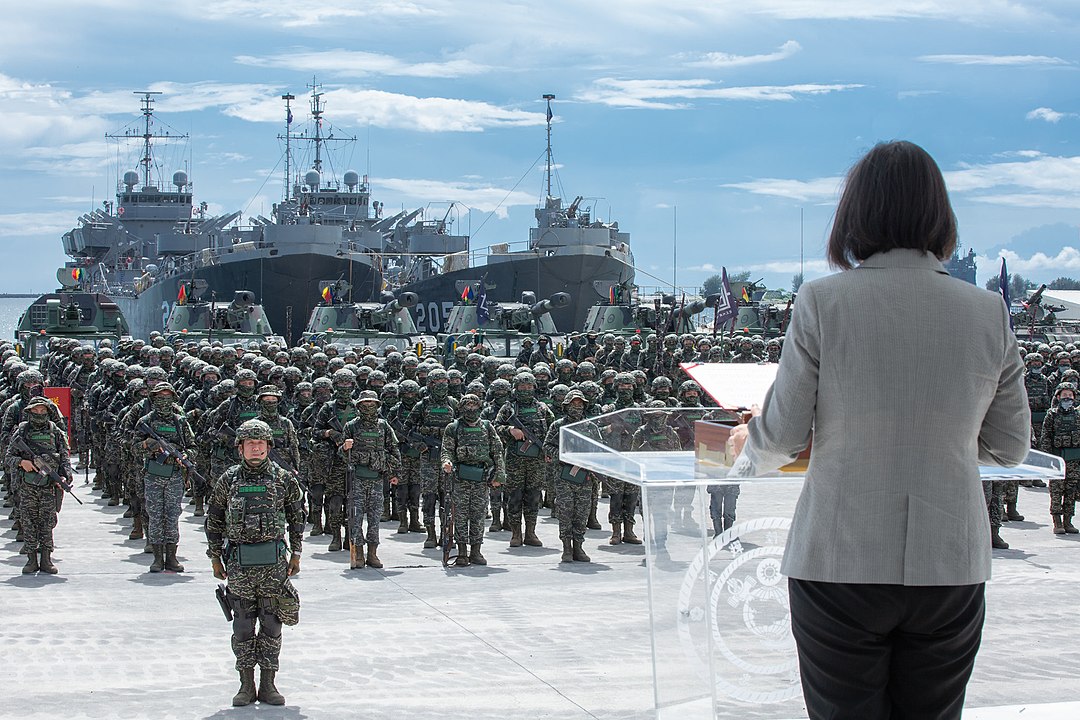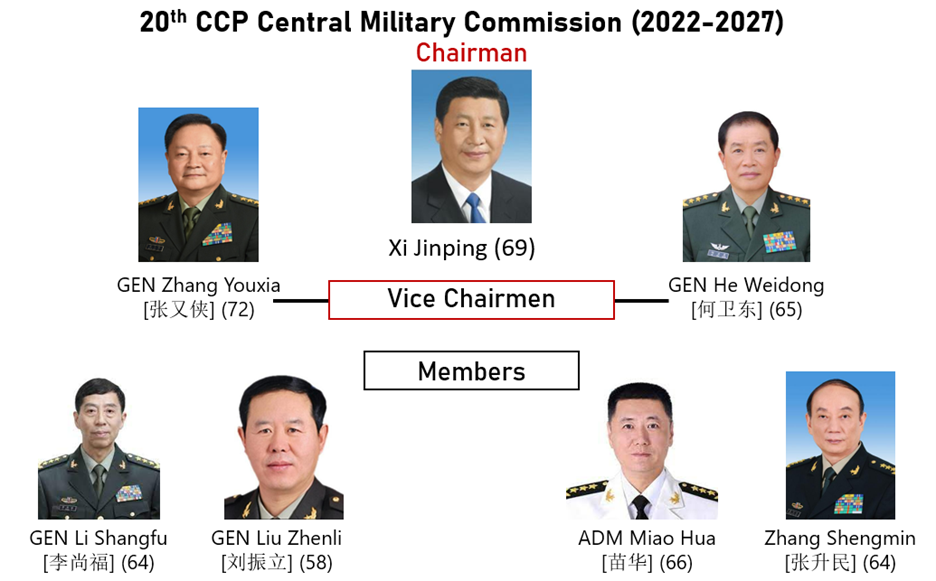
President of TAIWAN Tsai Ing-wen reviews a Marine Corps battalion in Kaohsiung in July 2020
“[The will to fight] depends on our (Taiwan’s) internal conditions. There are differences just on whether to resist China.”
Taiwan might not be prepared to resist a Chinese invasion, according to Shen Po-yang, an associate professor at the Institute of Criminology at Taipei University. The following article excerpt from Taiwan cable TV network Sanlih E-Television News highlights some of Shen’s remarks, which he gave during a meeting held by the World Taiwanese Association and the European Taiwan Association in Vilnius, Lithuania. Shen, who researches Chinese cognitive operations against Taiwan, attributes his conclusion to China’s growing technological capability in disinformation operations and Taiwan’s internal division. He explains that Chinese information operations against Taiwan primarily targets the 20 percent who consider themselves neutral, including those who are undecided on whether Taiwan should commit to war or surrender should the mainland invade. According to the article, a survey of Taiwan’s vulnerability to the Chinese Communist Party’s (CCP) cognitive warfare shows how divided the country is in its beliefs. For example, according to the survey, less than 20 percent of people in Taiwan believe the disinformation comes from external forces; 30 percent believe it comes from China; 20 percent believe it comes from the United States; and 20 percent believe it comes from Japan. According to Shen, “The reality is very far away (from what people believe).” Complementing the technical aspects of Chinese cognitive operations, Shen sees Xi Jinping’s continued emphasis on the “China Dream” as an ideology to win over the people when the economy is bad and he concludes that Taiwan’s will to resist will depend on their internal conditions. A study in the Oxford Journal of Global Security Studies,[i] explains that China’s vast cognitive operations against Taiwan are conducted through various governmental departments and party agencies that deal with Taiwan affairs including the Taiwan Affairs Office of the State Council, the United Front Work Department, the PLA, and Propaganda Department. The CCP’s primary goal is to promote unification and to increase Taiwan’s internal conflict and anti-independence views. The study describes four ways in which China conducts cognitive operations. First, China uses military intimidation as a kind of psychological manipulation to prevent Taiwan from seeking independence. Second, China uses economic and sociocultural factors to increase its influence by promoting bilateral exchange across the Taiwan Strait. Third, China uses Mazuism, a popular folk religion that originated in China but is practiced by 70 percent of Taiwan’s population, to strengthen its connection with Taiwan culturally. Finally, China uses disinformation and content farms on the internet to sway public opinion.[ii]
Sources:
“「台灣抵抗意志不如烏克蘭」學者:恐不及因應資訊戰 (Taiwan’s Will to Resist is Not as Good as Ukraine’s’; Scholar: It May Not Be Able to Cope With Information Warfare),” Sanlih E-Television News (Taiwan cable TV network), 11 September 2023. https://www.setn.com/News.aspx?NewsID=1351592&utm_campaign=viewallnews
Shen Boyang, a scholar who specializes in the CCP’s cognitive operations against Taiwan, said that he is worried that Taiwan does not have enough time to prepare for information warfare, because China’s technology is becoming more and more sophisticated, and Taiwan’s internal divisions have made The lack of will to resist China is different from the situation faced by countries such as Lithuania and Ukraine when facing Russia.
Shen Boyang pointed out at the forum that the main targets of China’s information manipulation on Taiwan are those who consider themselves neutral, neither blue nor green, including those who have not yet made up their minds on whether to commit war or surrender when facing the CCP’s invasion of Taiwan. This group of about 20% of Taiwanese people are gradually being China controls and locks in through cross-strait exchanges or the collection of personal information on the Internet.
His survey showed Taiwan’s vulnerability to the Chinese Communist Party’s cognitive warfare. For example, less than 20% of Taiwanese believe that fake news mainly comes from external forces, of which more than 30% point to China, but 20% each point to the United States or Japan. “With The reality is very far away.”
… there is the emotional aspect. After Xi Jinping came to power, he has continuously emphasized the “great rejuvenation of the Chinese nation” internally, which may become a self-fulfilling prophecy. Because in the past, the CCP could rely on the economy to stabilize its internal affairs. “When the economy is good, there is no need to talk about great rejuvenation, but when the economy is bad, it must use ideology.”What worries him most is the will of the Taiwanese people to resist. “This depends on our internal conditions. There are differences just on whether to resist China.” …
Notes:
[i] Tzu-Chieh Hung and Tzu-Wei Hung, “How China’s Cognitive Warfare Works: A Frontline Perspective of Taiwan’s Anti-Disinformation Wars,” Journal of Global Security studies, Volume 7, Issue 4, December 2022 https://academic.oup.com/jogss/article/7/4/ogac016/6647447
[ii] Social media has an important role in China’s cognitive warfare tactics. Social media can be used to spread “deepfakes” and “accelerationism” to deliberately manipulate emotions and collective consciousness to sway public opinion and exacerbate polarization. For more information, see Cindy Hurst, “Chinese Observations on the Role and Impact of Social Media in Cognitive Warfare,” OE Watch, 05-2022 https://fmso.tradoc.army.mil/2022/chinese-observations-on-the-role-and-impact-of-social-media-in-cognitive-warfare/; and Cindy Hurst, “China Wages Cognitive Warfare To Shape Taiwanese Public Opinion,” OE Watch, 02-2022. https://fmso.tradoc.army.mil/2022/china-wages-cognitive-warfare-to-shape-taiwanese-public-opinion/
Image Information:
Image: President of TAIWAN Tsai Ing-wen reviews a Marine Corps battalion in Kaohsiung in July 2020
Source: https://en.wikipedia.org/wiki/Republic_of_China_Marine_Corps – /media/File:President_of_TAIWAN_Tsai_Ing-wen_reviews_a_Marine_Corps_battalion_in_Kaohsiung_in_July_2020_臺灣總統蔡英文校閱海軍陸戰隊九九旅步二營.jpg
Attribution: CC By 2.0

